Have you ever wondered how solar panels work and why keeping them clean is important?
This article explores the basics of solar panels, how they function, and the significance of regular cleaning. We also discuss the risks of cleaning solar panels, including whether pressure washing can cause damage.
Step-by-step instructions on how to pressure wash solar panels are provided, along with precautions to take and whether it’s best to hire a professional. Learn all about maintaining the efficiency of your solar panels.
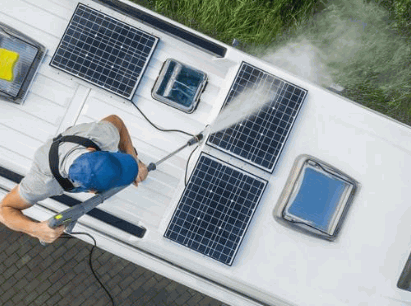
What Are Solar Panels?
Solar panels are devices that convert light from the sun into electricity, primarily used to power residential homes and commercial buildings. These panels are part of a larger solar panel system that generates renewable energy by harnessing sunlight.
Solar energy is a sustainable and environmentally friendly alternative to traditional electricity sources. The structure of solar panels typically consists of multiple photovoltaic cells made from silicon, which create an electric field when exposed to sunlight. This electric field then produces direct current (DC) electricity. An inverter within the system then converts this DC electricity into alternating current (AC), which is what powers most electrical appliances. Proper panel maintenance is essential to ensure optimal performance and longevity, such as keeping the panels clean and free from debris.
Learn more: Can You Pressure Wash The Roof

How Do Solar Panels Work?
Solar panels work by capturing sunlight through solar cells, which then convert the sunlight into direct current (DC) electricity. This electricity is then converted into alternating current (AC) power using an inverter, making it usable for powering homes and businesses.
Once the sunlight hits the solar cells, the photons in the light are absorbed, releasing electrons in the process. These electrons flow through the cells, generating an electric current. The direct current produced by the solar cells needs to be converted into alternating current through the inverter because most appliances and electrical grids operate on AC power. The inverter performs this crucial function by changing the current’s direction, ensuring compatibility with the devices connected to the power output.
Why Is Cleaning Solar Panels Important?
Cleaning solar panels is essential to maintain their performance and efficiency over time. Dirt and debris can accumulate on the panels, reducing their ability to absorb sunlight effectively, which can impact energy production.
Regular panel maintenance and cleaning play a crucial role in ensuring optimal performance. It is recommended to clean the solar panels at least twice a year, or more frequently if located in dusty areas or exposed to bird droppings. Over time, accumulated dirt not only hinders sunlight absorption but also creates a barrier that affects the longevity of the panels. Utilizing appropriate cleaning solutions and ensuring proper rinsing to remove any residue is key to maximizing energy output. Keeping the panels free of roof runoff and shading from nearby trees or structures can further enhance their efficiency.
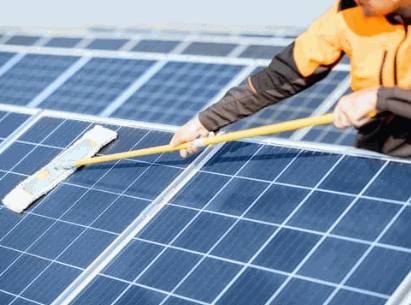
What Are The Risks Of Cleaning Solar Panels?
While cleaning solar panels is crucial, there are risks involved, such as potential damage to the panels if not cleaned correctly. Safety precautions must be taken to avoid accidents, especially when water and electrical components are involved.
One common risk associated with cleaning solar panels is the use of high-pressure washing methods. While pressure washing can be effective in removing stubborn dirt and debris, using too much pressure can lead to cracks or scratches on the delicate surface of the panels. It is essential to use gentle cleaning techniques, such as a soft brush or sponge, to prevent any harm to the panels.
Regular maintenance and inspection of cleaning equipment are also crucial to ensure that they are functioning properly and do not pose any risks during the cleaning process. Faulty equipment can increase the chances of accidents, so it is essential to check for any defects or malfunctions before starting the cleaning task.
Can Pressure Washing Damage Solar Panels?
Using pressure washing on solar panels can potentially cause damage if not done with caution. The high pressure of the water can crack or scratch the panels, affecting their efficiency and longevity.
It is crucial to opt for gentle cleaning methods when it comes to maintaining solar panels. Manual cleaning with a soft brush and mild cleanser is often recommended over pressure washing to minimize the risk of damage.
Professional cleaners are well-equipped with the right tools and knowledge to ensure a thorough yet safe cleaning process for solar panels. They understand the delicate nature of the panels and use appropriate techniques to keep them in optimal condition.
By prioritizing gentle cleaning methods and seeking professional assistance when needed, solar panel owners can prolong the lifespan and performance of their investment.
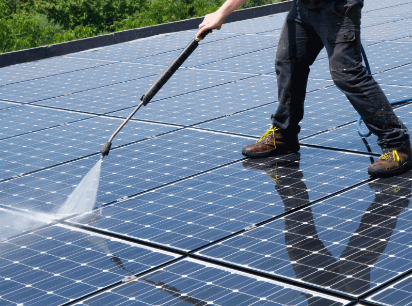
What Other Cleaning Methods Can Be Used?
Apart from pressure washing, alternative cleaning methods for solar panels include using water combined with a mild detergent or relying on natural rainwater to rinse off dust and dirt.
When considering using water and detergent for solar panel cleaning, it is crucial to ensure that the solution is gentle to avoid any potential damage to the panels. Many experts recommend using a mixture of water and mild soap to effectively remove grime without leaving residue. On the other hand, relying on rainwater for cleaning not only helps conserve water but also takes advantage of its natural cleaning properties, making it a cost-effective and eco-friendly solution for maintaining the efficiency of solar panels.
How Often Should Solar Panels Be Cleaned?
Solar panels should be cleaned regularly to ensure optimal performance, with most experts recommending cleaning at least once or twice a year.
Regular maintenance is crucial not only for keeping the panels clean but also for enhancing their efficiency. Accumulated dirt and debris can significantly reduce the absorption of sunlight, leading to decreased energy production. By incorporating simple tips such as using a gentle soap and soft brush or sponge, you can maintain the panels’ efficiency without causing damage. Cleaning also allows you to inspect for any damage or issues that might affect performance, ensuring that your solar energy system operates smoothly for years to come.
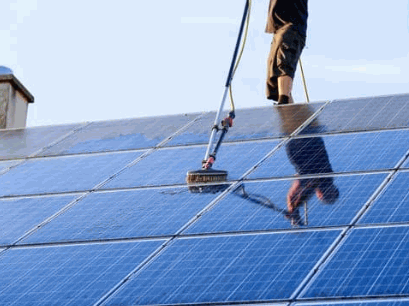
What Are The Signs That Solar Panels Need To Be Cleaned?
Several signs indicate that solar panels require cleaning, including reduced energy production, visible dirt or debris on the panels, and an increase in energy bills due to higher energy usage to compensate for reduced efficiency.
Another common indicator that solar panels may need cleaning is a noticeable decrease in the overall performance of the panels. This can manifest as a drop in the amount of energy being generated, leaving you with less power to cover your consumption needs.
If you start to see streaks or grime accumulating on the surface of the panels, it’s a clear sign that they are in need of a good scrub. In some cases, you might also observe bird droppings or other organic matter that can further obstruct the solar cells’ ability to capture sunlight effectively.
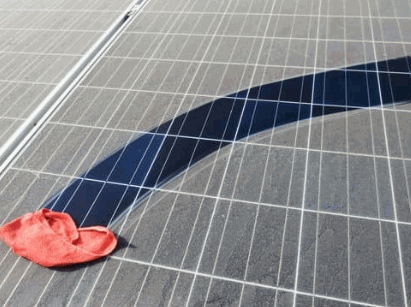
What Are The Steps To Pressure Wash Solar Panels?
Pressure washing solar panels requires specific steps for effective cleaning. Preparation of the area, choosing the right equipment and cleaning solutions, using the correct nozzle, washing the panels, and rinsing and drying are crucial steps in the process.
When preparing the area for pressure washing, make sure to remove any debris that may obstruct the panels. The next step involves selecting the appropriate equipment including a pressure washer with adjustable pressure settings. Safety goggles, rubber gloves, and sturdy shoes should be worn to protect yourself during the cleaning process.
Utilize gentle cleaning solutions such as biodegradable detergents to avoid damaging the panels. Adjust the nozzle to a wide spray pattern to prevent concentrated pressure on the sensitive surface of the solar panels. Working in small sections, wash the panels methodically from top to bottom.
After completing the washing process, rinse thoroughly with clean water to remove any residue. Allow the panels to air dry or gently wipe them with a soft cloth.
Step 1: Prepare The Area
Before pressure washing solar panels, it is vital to prepare the area by removing any obstacles that may hinder the cleaning process. Hiring a professional for complex or hard-to-reach areas is advisable for optimal results.
Proper area preparation not only ensures a more effective cleaning but also reduces the risk of accidents that may occur if obstacles are left in place. In areas like Nassau County, where environmental factors can impact solar panel efficiency, thorough cleaning is essential for optimal energy production.
Professional cleaning services can provide expertise in handling different types of solar panels and use appropriate cleaning agents to maximize their performance. They also ensure safety by using the right equipment and techniques, especially for installations done by solar installers to prevent damage.
Step 2: Choose The Right Pressure Washer
Selecting the appropriate pressure washer is crucial for cleaning solar panels effectively. Ensure the equipment has adjustable pressure settings and suitable nozzles to prevent damage to the panels.
When choosing a pressure washer for solar panel cleaning, it’s essential to opt for a model that allows you to adjust the pressure output based on the specific requirements of your panels. The pressure settings should be versatile enough to cater to delicate solar panel surfaces without causing any harm. Using the correct nozzles is equally important to ensure the water flow is appropriately dispersed and doesn’t create excessive pressure in one spot. This balanced approach is crucial in maintaining the integrity of your solar panels over time.
Step 3: Use The Correct Nozzle
Using the correct nozzle during pressure washing is essential to control the water flow and prevent damage to the solar panels. A wider, lower-pressure nozzle is recommended for gentle yet effective cleaning.
By opting for a wider, lower-pressure nozzle, you can ensure that the water flow is gentle enough not to harm the delicate surface of the solar panels yet effective in removing dirt and debris without causing any damage. This careful selection plays a crucial role in not only maintaining the appearance of the panels but also in enhancing their performance over time. A suitable nozzle helps to safeguard the panels against potential cracks or scratches that could occur with excessive water pressure.
Step 4: Start Pressure Washing
Begin pressure washing the solar panels by working methodically from one end to the other, ensuring thorough coverage without excessive pressure. Use a gentle cleaning approach to avoid damaging the panels.
When embarking on the pressure washing process, it is essential to start by inspecting the panels for any debris or buildup that could hinder their efficiency. Clear any noticeable obstructions before proceeding with the gentle cleaning techniques. Consider using a soft bristle brush or a low-pressure nozzle attachment on the pressure washer to provide a delicate yet effective clean. Remember, the goal is not just to remove visible dirt but also to enhance the panels’ overall performance. Be cautious around delicate components and wiring, ensuring a systematic and careful approach throughout the cleaning process.
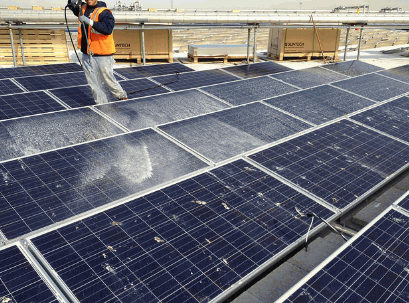
Step 5: Rinse And Dry The Panels
After pressure washing the solar panels, rinse off any remaining soap or debris with clean water. Allow the panels to air dry or use a soft cloth for drying to prevent water spots.
It is crucial to ensure that all soap residue is completely removed during the rinsing process. Residual soap can interfere with the efficiency of the panels and lead to streaks or spots on the surface. To achieve a spotless finish, thorough rinsing is essential.
Once the panels have been rinsed and are free of soap, the next step involves drying them properly. This is where attention to detail can make a significant difference in the final result. Using a soft cloth to gently dry the panels ensures that no water spots are left behind, leaving the solar panels shining and ready to capture optimal sunlight.
What Precautions Should Be Taken When Pressure Washing Solar Panels?
When pressure washing solar panels, safety precautions must be a top priority to avoid damage to the panels or electrical components. Avoid cleaning during rainy or wet conditions to prevent accidents.
Working with water and electricity poses unique risks, making it crucial to follow proper safety measures throughout the cleaning process.
One of the key aspects of maintaining solar panel longevity is to minimize any potential damage that could occur from improper cleaning techniques or accidents.
It is essential to recognize the hazards associated with wet conditions and electrical components when cleaning solar panels, highlighting the need for vigilance and caution at every step of the process.
Can You Pressure Wash Solar Panels Yourself Or Should You Hire A Professional?
While it is possible to pressure wash solar panels yourself, hiring a professional cleaning service may be safer and more effective, especially for large or difficult-to-reach panel systems. Professionals have the right equipment and expertise for thorough cleaning.
One significant advantage of turning to experts for solar panel cleaning is the assurance of safety during the process.
DIY attempts may pose risks due to inadequate knowledge of the system and the safety measures required.
Professionals not only have the necessary training to handle the cleaning efficiently, but they also follow strict safety protocols to protect both the panels and themselves.
The specialized equipment utilized by professional services ensures a meticulous cleaning that may not be achievable with standard at-home tools.
Conclusion
Regular maintenance and cleaning of solar panels are crucial for ensuring optimal efficiency and longevity of the panel system. By following proper cleaning techniques and safety precautions, solar panel owners can maximize their energy output and reduce the risk of damage.
Proper maintenance not only enhances the performance of solar panels but also extends their lifespan, providing long-term benefits. Maintaining clean panels ensures that sunlight is efficiently converted into energy, allowing the system to function at its best capacity.
Regular inspections can help identify any potential issues early on, preventing costly repairs in the future. Cleaning panels regularly helps in preserving the integrity of the solar cells, leading to consistent energy production over time.
Following these maintenance tips can significantly impact the overall efficiency and durability of your solar panel setup.
